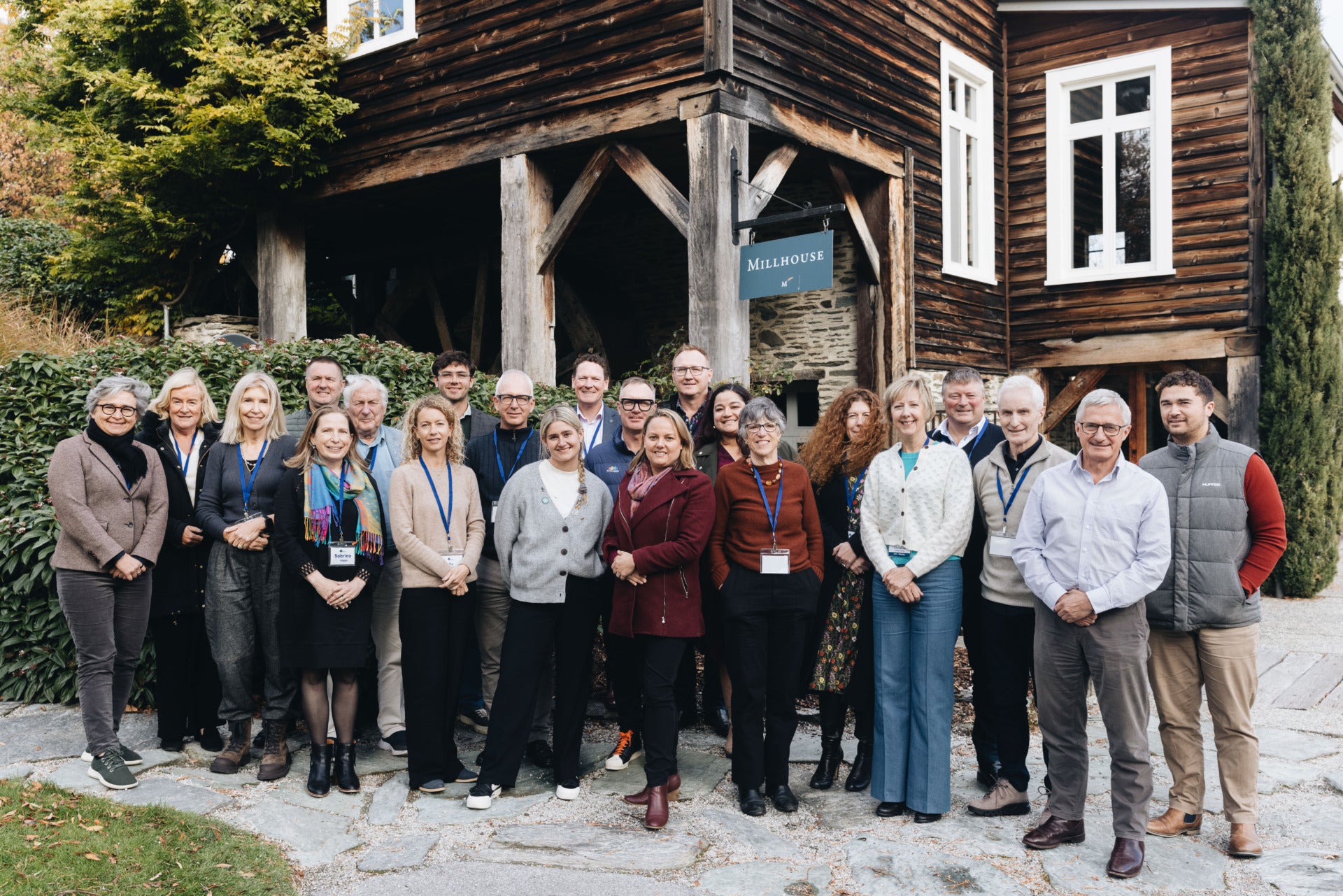This post is part of a series of interviews with thought leaders to explore issues on the frontier of the complex domain of ESG.
![]()
When a recruiter reached out to Dave Stangis about a new leadership role at Apollo Global Management, Inc., an asset management firm with nearly $550B in assets under management, Stangis was intrigued, but also a bit surprised. “I actually asked several times, ‘Are you sure you’re looking for somebody with my background to come into this firm?’” says Stangis. He had spent two decades pioneering corporate responsibility and sustainability policies at Campbell Soup Company and Intel, two companies that, as different as they are, are both consumer-facing brands offering familiar products. Why did a global alternative asset manager and retirement services firm like Apollo want to recruit someone who drove change in sectors like soup and computer chips?
“I recall an early conversation with Scott Kleinman, Apollo Co-President and lead on the search. He told me they were looking for a leader with operations experience, someone who knew what the words ‘industrial hygiene’ meant, and had been inside operating businesses and plants, to help them build something. All of that appealed to me,” says Stangis. He adds: “The scale, the impact, the people I met. When you take a look at the private equity funds’ investments broadly, you’re talking hundreds of thousands of employees and billions of dollars of revenue. It’s almost like a multi-sector Fortune 20 company—not to mention the companies Apollo-managed credit and hybrid funds support on the financing side of the business.” Put another way: At Campbell and Intel, Stangis influenced the sustainability operations of one Fortune 500 company at a time. Today, in his new role, his team helps to support ESG considerations for hundreds of companies into which Apollo-managed funds have invested capital—as debt or equity.
Stangis’ pivot is indicative of a broader transformation taking place in the world of private capital, most notably private equity. It’s a shift that other commentators have been keen to analyze. For example: Robert G. Eccles, Vinay Shandal, David Young, and Benedicte Montgomery argued in “Private Equity Should Take the Lead in Sustainability,” that while private equity may call to mind images of 1980s “corporate raiders,” the private equity approach to overhaul businesses to maximize value also presents a unique opportunity to rethink companies’ environmental and social practices, and impact. “A PE firm has virtual control of its portfolio companies from an ownership and governance perspective, even when it doesn’t own 100% of a company,” Eccles et al write, noting that private equity firms can take a longer-term view, as portfolio companies are not bound to the quarterly earnings reporting cadence required of many publicly traded companies.
Of course, as Eccles et al note, private equity hasn’t been known for a focus on long-term societal aspects of business—at least not to date. Enter firms like Apollo, and experts like Dave Stangis, to change that. The Aspen Institute’s Business & Society Program executive Judy Samuelson recently spoke with Stangis, now Apollo’s Chief Sustainability Officer, about his experience accelerating change in the industry.

Judy Samuelson: We’re seeing greater interest in sustainability from the world of private capital. What do you see when you look across the industry? What’s the role that you see private capital playing amid this tremendous shift to a green economy?
Dave Stangis: Two things are happening. The first is that the importance of private capital in markets continues to increase broadly every year. There are more business entities looking for private capital; on a macro level, this whole world of private capital is growing. As a result, leaders at firms like Apollo recognize their evolving role in society. There’s this mindset of, “We manage a lot of capital, we have a responsibility to help.” Second, the integration of sustainability ideas in investing has been quietly moving forward for many years. It’s moved through public and private markets; it’s been done here at Apollo in one form or another for more than a decade. We have nearly 15 years of formal ESG due diligence, reporting and data collection. But the big shift came a few years ago with the energy transition and the investment opportunity it represents. There’s the collective wake-up call that the world has decided on a carbon and energy transition. That’s going to require trillions of dollars over decades of work. We believe we are well-equipped to help finance that transition.
JS: Public companies are under pressure to disclose much more about their ESG risks and opportunities. The same requirements don’t apply to privately held companies. What do you think will hold them accountable for managing these risks and opportunities, and for the ESG-related commitments that they make?
Stangis: There’s a lot of demand-driven behavior from investors. For example, our investors, no matter who they are—pension funds, sovereign funds, family offices—have asked us to meet their stringent expectations for performance. They continually ask us about our thinking on ESG factors in due diligence and investments. There is this broad, global effort around data, data quality, the ability to report to our LPs (limited partners) and investors, to report publicly in regulatory frameworks coming out of Europe, the UK—and soon in the US. So, there’s a lot of lifting being done by my team and others at Apollo to meet that regulatory demand or customer-investor client expectation.
JS: You said Apollo has already been doing ESG due diligence for a while. What’s different now? What are you doing to ensure that ESG concerns are embedded fully within the strategy and operations of your portfolio companies?
Stangis: Several years ago, the leadership of the firm felt like we had reached a point where we needed to refresh our approach to diligence, one that was more systematic and strategic and reflected the evolving best practices within the industry. Now we are looking at everything through a sustainability lens. We want Apollo to be known as the firm that does this right. So we are building sustainability into our business processes; whether we are reviewing credit or equity opportunities, sustainability is part of the analysis. It’s hardwired into deal making, risk identification and the due diligence processes. Apollo deal teams and portfolio managers have been key partners in this journey.
JS: Can you give us an example of how you’re hardwiring this?
Stangis: There are many examples of hardwiring across our Credit, Equity and Real Asset businesses. One specific example relates to decision criteria and taxonomy for our Sustainable Investing Platform. If we see a renewable or solar farm or an EV company, there may not be a lot of questions about whether or not that’s an investment in the clean energy transition. But what about a large company that uses a lot of water or fuel? Consider an industrial company where 30% of the business today uses renewable inputs and 70% is virgin petrochemicals, but has a credible plan to move that 30% to 80% over the projected holding period, driving real economy decarbonization. An Apollo fund investment can help the company unlock that potential. That’s the kind of investment that would fit our model today. We aim to be a leading capital provider to the energy transition by supporting companies globally and serving as a one-stop shop for holistic capital solutions.
JS: The “S” part of ESG is where private equity gets the most criticism—the stereotypes about firms laying people off and tightening the ship in order to optimize returns. What would you say to that?
Stangis: We are equally committed to the “S”. As part of our strategy, we have broad diversity and inclusion targets. For example, we do formal training and have developed tool kits around veteran and diverse hiring. We are a founding member of a program called Ownership Works which supports equity ownership for employees of certain types of portfolio companies. We launched a goal to achieve $1 billion in spend with diverse suppliers across our private equity funds’ portfolio companies. We also have people on staff focused on human capital and talent development.
Additionally, on the G side, we train our investment professionals that sit on portfolio company boards on what good governance looks like, the roles of board committees, and how sustainability issues might be considered in a private company boardroom. We have dedicated team members focused on data and reporting.
JS: As you look ahead to the next few years in private capital, what most excites you?
Stangis: We’re spending most of our time building the tools, the processes and the data capabilities to work with our deal teams and LPs [limited partners] and provide the information they want to know about their investments. We’re designing an approach that is tailored to our clients’ demands and increasing regulatory requirements. But we’re also helping them understand the art of the possible, which I find most exciting. What opportunities may emerge in the market over five years? What’s the trajectory of this sector or that company; how can we help unlock and create financial value for our clients? How do we build a simple, yet robust management system that helps Apollo and our funds’ investments excel in the near term but also be more valuable in the market transition to a greener economy? I’m excited to continue to tackle these questions over the next few years.
This interview has been edited for length and clarity.
For Dave Stangis, the call that started a new chapter in his professional life might have come as a surprise. Yet, if business is to rise to the society-wide challenge of transitioning to a green economy, such calls for talent that can scale sustainability practices will have to grow more common. Where ESG has often been used to scan for risk, stories like Dave’s suggest the field is moving toward identifying future opportunities for value creation—the art of the possible.
![]()
This post is part of an interview series with thought leaders to explore frontier issues in the complex domain of ESG. These issues will be explored in Aspen at the Aspen ESG Summit from July 11-13, 2023.
SUBSCRIBE TO OUR MONTHLY NEWSLETTER!
Want more insights like these on business and the health of society? Sign up to receive thought leadership and updates from the Business & Society Program each month!

